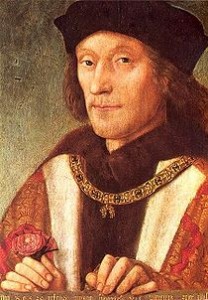 At 11pm on Saturday 21st April 1509, Henry VII died. He had known that he was dying for some time and had retired to Richmond at the end of February to spend his last days there.
At 11pm on Saturday 21st April 1509, Henry VII died. He had known that he was dying for some time and had retired to Richmond at the end of February to spend his last days there.
There is an excellent chapter, “The Art of Dying”, in Thomas Penn’s “Winter King”, in which he describes how Henry VII prepared himself and his kingdom for his death. John Fisher, the bishop Henry’s son would end up executing, was the main person helping the King through those last days. However, it wasn’t spiritual comfort he offered, “he interrogated Henry relentlessly, in the way that priests did in order to bring the dying to a ‘wholesome fear and dread’ of their sinful condition”. Poor Henry! Henry promised that there would be a “true reformation of all them that were officers and ministers of his laws” if God spared him. It wasn’t to be.
Penn describes how the King “made an exemplary death”, kissing the crucifix, beating it against his chest and then holding a taper to light his path as he slipped away. His death was kept secret for two days, being announced to the Knights of the Garter at their St George’s Day feast on 23rd April. It was not announced to the public until 24th April.
It was the end of Henry Tudor, the man who had beaten Richard III at the Battle of Bosworth Field, starting a new dynasty. The throne passed successfully (a feat in itself) to his son, also named Henry, who became Henry VIII.
Notes and Sources
- Winter King, Thomas Penn, p333-351